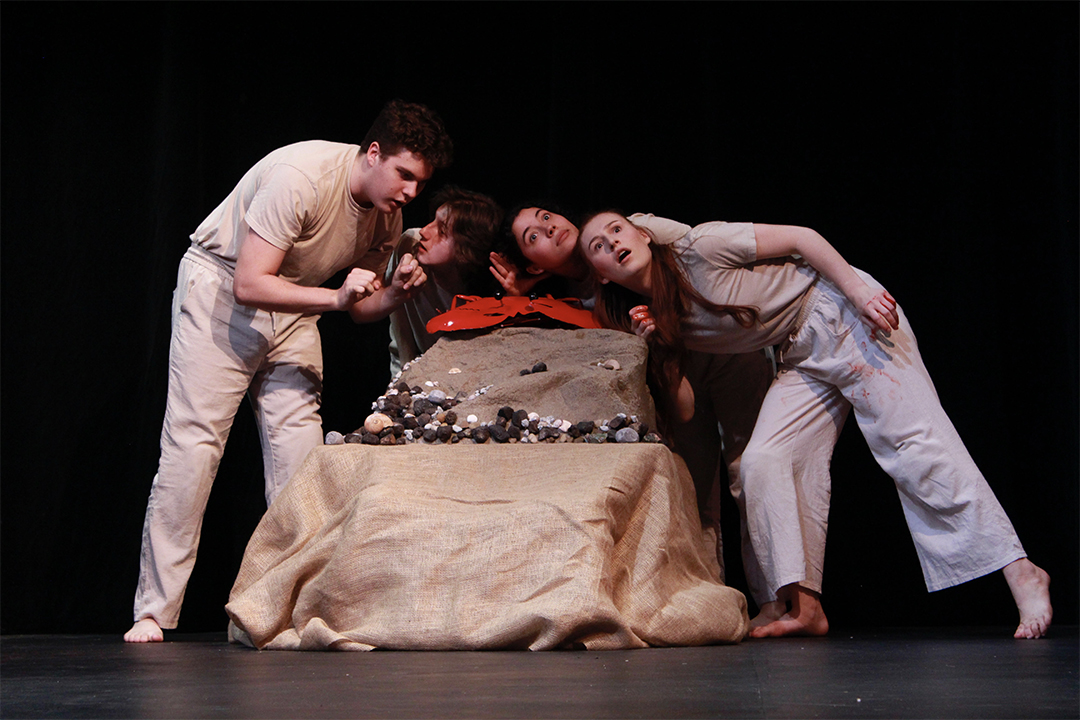The 2022–2023 academic year has been an incredible year for campus theatre, proven by two spectacular productions staged on the weekend of April 27 as the academic year drew to a close. Lizzie: The Musical, which premiered at the George Ignatieff Theatre, and Crab Mentality, whose return premiered at the Helen Gardiner Phelan Playhouse, were both staged by independent groups of emerging professionals and demonstrated the theatrical talents of the U of T community. The Varsity interviewed the cast and crew of both productions about their creative vision and experience.
Lizzie: The Musical
As Isabella Cesari — the play’s director — explained in an interview with The Varsity, Lizzie: The Musical is the first independent production of Thaumatrope Theatre, a new production company established by U of T students and alumni. Cesari created the company last year while working on another production in collaboration with U of T, and she and Caitlyn Grant — the show’s stage manager — revived Thaumatrope Theatre to produce Lizzie.
Cesari described the company as “pre-professional,” explaining that it provided artists with a more flexible work environment to learn and take risks. “I think, for me, it’s really about creating an opportunity for early career and student theatre artists where they’re not beholden to a sort of professional or higher ranking… where they have the opportunity to work together as peers,” Cesari said.
It’s unsurprising, then, that the company has also chosen to stage an unconventional musical. Cesari considers Lizzie to be very different from most musical theatre, and she called it “underrated.” Though the play is based on the true crime story of the Borden family murders, Cesari explained that it’s much less focused on accuracy to the Borden story than on its themes of family, sexuality, and anger. Josie Dolin, who plays Lizzie’s love interest Alice, said that the show is really about the bond between four women.
Cass Iacovelli, a fourth-year student who plays Bridget, added that the show is “extremely camp and chaotic and fun.” They noted that the dark moments are well balanced by the genuinely sentimental ones, making it a very entertaining production.
“It’s fun to see a show that you can go into and have a good time and see four women do a power house rock musical, [while] also talk about killing their abusive father,” they said.
Indeed, the show was a delight to watch. All of the actors portrayed their characters in a compelling way, and the show’s emotions were wonderfully communicated through the music, set, and costumes.
Nika Gottlieb, the show’s costume, hair, and makeup designer, noted that designers need to know the play that they’re working on well — which includes not only reading it but also attending rehearsals — to design costumes and makeup effectively. The show finds a middle ground between the show’s Victorian time period and the music’s rock and roll aesthetic. Grant added that the whole play takes care to include a lot of throughlines that make it feel like a cohesive piece of art.
Crab Mentality
Just a few blocks away, another group of U of T students and alumni were restaging an originally written play that premiered last summer and was revived for a second showing. Crab Mentality — whose writers sat down to talk to The Varsity before last year’s premiere — follows a group of people who begin to worship a crab after getting stranded on a deserted island, is an absurdist and dark comedy that deftly balances its more serious elements with humour.
During a question and answer (Q&A) session after the show, the cast and crew expanded on their experience putting on the show a second time. “The script is really different,” said Chloë Rose Flowers, who co-wrote the show and played Leader in both versions. “The general plot is still the same… [but] it’s a lot more refined.”

Molly Dunn — another writer and, this time around, the show’s director — noted that it’s a rare opportunity to work on a show for so long. Nick Cikoja, who played Prophet in both versions, added that “the entire experience [was] so different from what the original production [had been].”
Dunn said that the team really tried to lean into the comedy this time around. Her goal, specifically, was to draw a starker contrast between the first half of the show, which is more lighthearted, and the second half, which becomes shockingly violent.
“A lot of the comedy honestly just came out of these wonderful [cast members] — they’re all very, very funny humans,” Dunn said. Many of the new comedic elements arose organically during rehearsals. The result is a play that provokes visceral reactions from its audiences, from belly laughs to shocked silences.
Flowers concluded the Q&A by reflecting on the hard work of both the original and the current cast and crew. “We knew after [the first] rendition of the show [that] there was more that we wanted to do with it… We wanted the show to have another life and reach more audience members. So here we are!”


